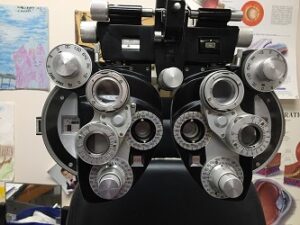 The source for today’s post is the sermon my pastor, Josh Waltz, preached yesterday. As I think I’ve mentioned, we’re going through the Old Testament book of Ecclesiastes, and what a fascinating and encouraging journey it’s turning out to be. Yesterday we were in chapter 7, and Josh started out by telling a story about Teddy Roosevelt’s childhood from his autobiography (named, aptly enough, The Autobiography of Theodore Roosevelt
The source for today’s post is the sermon my pastor, Josh Waltz, preached yesterday. As I think I’ve mentioned, we’re going through the Old Testament book of Ecclesiastes, and what a fascinating and encouraging journey it’s turning out to be. Yesterday we were in chapter 7, and Josh started out by telling a story about Teddy Roosevelt’s childhood from his autobiography (named, aptly enough, The Autobiography of Theodore Roosevelt). We all know that TR wore those little round spectacles, but what we (or at least I) didn’t know is that he didn’t get those glasses until he was 13 years old. Up until then, his extreme nearsightedness limited his activities severely. Finally he realized that something was very wrong when his friends were talking about the huge words on a billboard that he couldn’t make out at all. His father took him to a doctor and he got those glasses. Here’s what he had to say:
I spoke of this to my father, and soon afterwards got my first pair of spectacles, which literally opened an entirely new world to me . . . I could not see, and yet was wholly ignorant that I was not seeing (p. 16 of the 2009 paperback edition).
Josh’s point that he used the TR quotation to illustrate was:
We see the world not as it is, but as we are.
To which, courtesy of TR, I’d add in:
But we think that we are seeing the world as it is.
It never occurs to us that we aren’t seeing the world correctly. Add in confirmation bias, and we’re all set to have a distorted view of the world. (Confirmation bias, as you almost certainly know, is the human tendency to pay attention and give credence only to those ideas that confirm what we already believe. I see this force at work in my own life all the time. I have extremely strong political views, as you already know if you follow my personal Facebook page or read my political blog, and I get rather tickled at myself when I realize that as I click through the news outlets I follow I’m looking for headlines that confirm what I already believe. So what makes me think that I’m going to change anyone else’s mind? If they don’t agree with me already then they’re not going to take the time to read what I post, are they? What a depressing thought.)
I have a great deal of sympathy with TR’s eyesight woes, and I can say from experience that getting new glasses can indeed be transcendent. While I don’t think I had any problems in school from my nearsightedness since it was discovered fairly early on, I do very clearly remember what it was like each year during at least elementary school when I’d get new lenses for my glasses. My eyes would get worse each year, but it would be so gradual that I wouldn’t notice. Then I’d go in for the yearly checkup, get fitted for new lenses, walk out of the eye doctor’s office wearing them and realize, ‘Wow. Look at that. I can actually see individual leaves on the trees.’ (And yes, I do actually recall those specific thoughts from at least one of those times.) Then the whole cycle would start again. Finally, sometime in high school, I traded in my Coke-bottle-bottom glasses for a pair of contacts, saving up my money to cover the $200 it cost for the fitting and the lenses themselves. What a great day that was. I got rid of the glasses, and the contacts seemed to help stabilize my eyes so that I didn’t need such frequent prescription updates. (At this point I have cataracts in one eye, extremely thin and fragile retinas with one repair, tons of floaters, and uneven eye tracking that results in double vision. I wear contacts with glasses over them to correct the actual vision problems. Nothing will cure the retinas and floaters, however. One of these days I’ll have to get cataract surgery, but so far the evaluation is that they’re not yet bad enough to make the risk worthwhile, as any eye surgery de-stabilizes the eye, including the retinas. Hey, I’m just grateful for all these high-tech lenses that make it possible for me to see as well as I do!)
But back to the matter at hand. Jim and I often say that we’re very capable of seeing others’ blind spots but we think we don’t have any of our own. I get very frustrated with people who won’t just listen to what I say and change their minds, blast it! Could it be that my attitudes in this regard is my own personal blind spot? Or my own retinal tear? My cataract?
Maybe so. How about you? Are you going through life with a blind spot, or with at least some blurry vision? How could you see more clearly so that you’re perceiving “the world as it is” instead of “the world as you are”?
Link to the TR autobiography is an Amazon Affiliate link. If you click through and purchase the book, or any other items from Amazon, I will receive a small commission at no additional cost to you.